Business Ethics Report: Volkswagen's Ethical Issues and Analysis
VerifiedAdded on 2020/06/04
|12
|4106
|121
Report
AI Summary
This report delves into the realm of business ethics, exploring various ethical approaches, including moral objectivism, deontology, and teleological ethical theory. It examines the distinction between absolute and relative ethics, emphasizing the importance of ethical decision-making for businesses like Volkswagen. The report outlines ethical issues affecting operational activities, such as employment law, equal opportunity, and diversity. It highlights how ethical considerations influence business objectives like sales and profitability, as well as the implications for stakeholders. Furthermore, it discusses the role of a company as a moral agent, providing examples of ethical practices and mechanisms for employee involvement. Finally, it addresses current ethical issues and suggests ways businesses can improve their ethical operations, including the implementation of an ethical code.
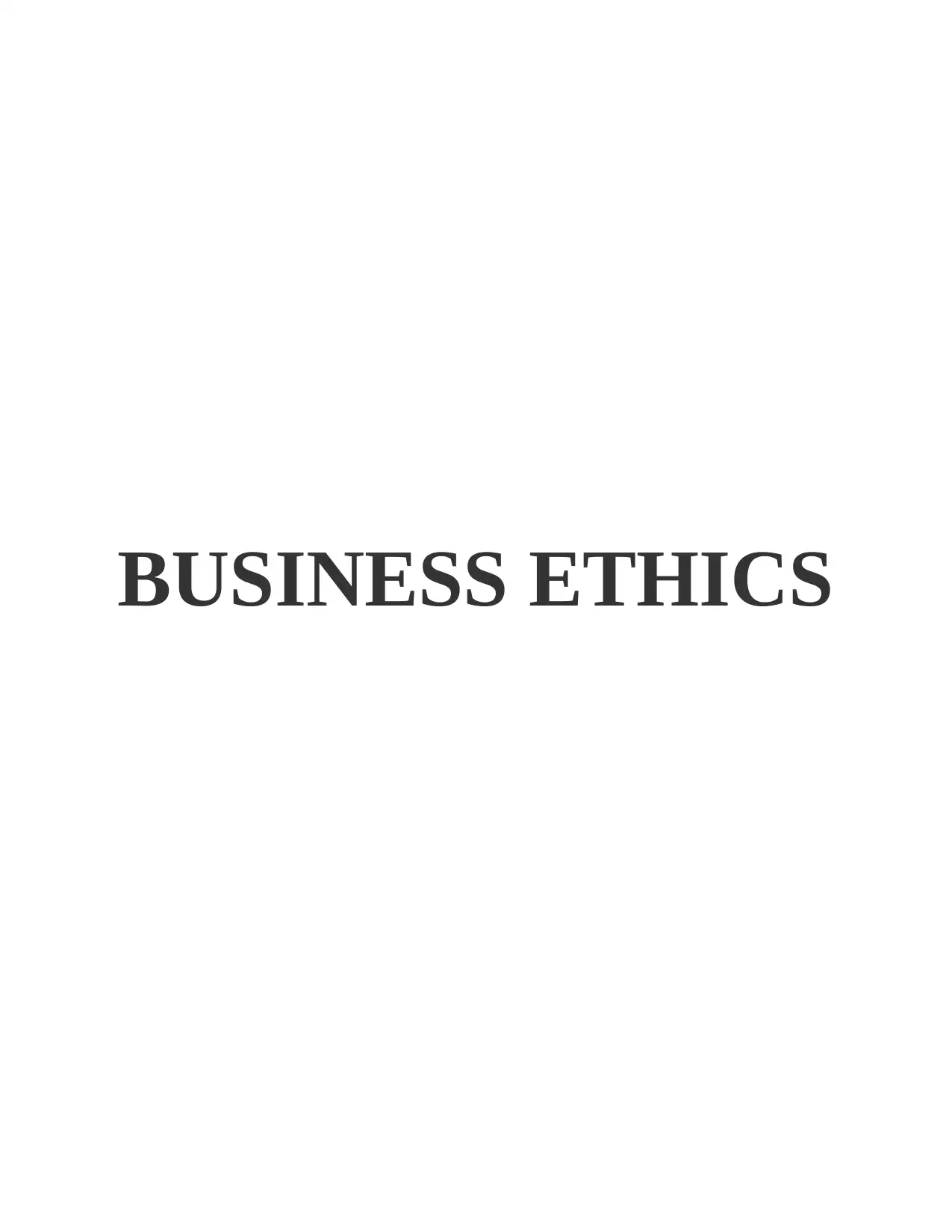
BUSINESS ETHICS
Paraphrase This Document
Need a fresh take? Get an instant paraphrase of this document with our AI Paraphraser
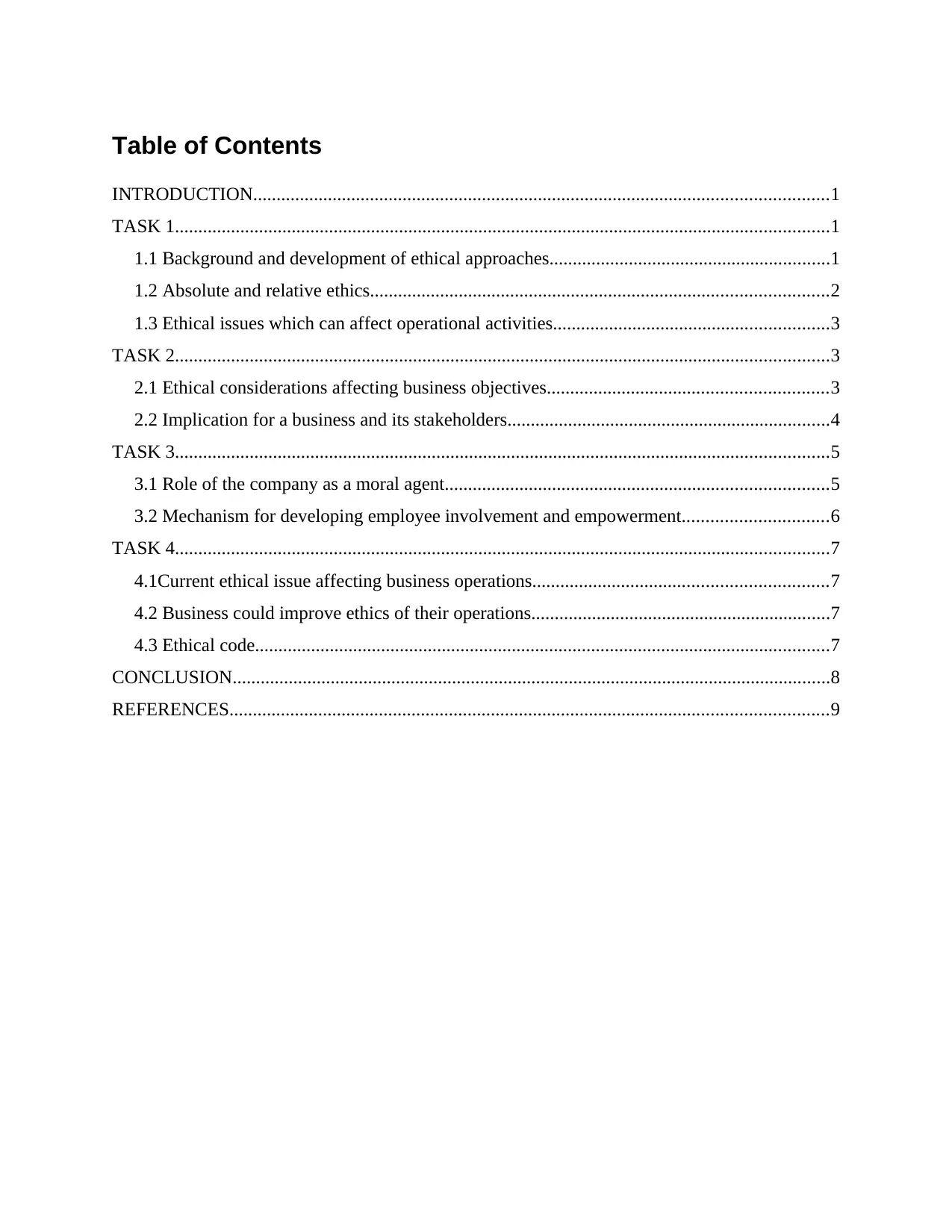
Table of Contents
INTRODUCTION...........................................................................................................................1
TASK 1............................................................................................................................................1
1.1 Background and development of ethical approaches............................................................1
1.2 Absolute and relative ethics..................................................................................................2
1.3 Ethical issues which can affect operational activities...........................................................3
TASK 2............................................................................................................................................3
2.1 Ethical considerations affecting business objectives............................................................3
2.2 Implication for a business and its stakeholders.....................................................................4
TASK 3............................................................................................................................................5
3.1 Role of the company as a moral agent..................................................................................5
3.2 Mechanism for developing employee involvement and empowerment...............................6
TASK 4............................................................................................................................................7
4.1Current ethical issue affecting business operations...............................................................7
4.2 Business could improve ethics of their operations................................................................7
4.3 Ethical code...........................................................................................................................7
CONCLUSION................................................................................................................................8
REFERENCES................................................................................................................................9
INTRODUCTION...........................................................................................................................1
TASK 1............................................................................................................................................1
1.1 Background and development of ethical approaches............................................................1
1.2 Absolute and relative ethics..................................................................................................2
1.3 Ethical issues which can affect operational activities...........................................................3
TASK 2............................................................................................................................................3
2.1 Ethical considerations affecting business objectives............................................................3
2.2 Implication for a business and its stakeholders.....................................................................4
TASK 3............................................................................................................................................5
3.1 Role of the company as a moral agent..................................................................................5
3.2 Mechanism for developing employee involvement and empowerment...............................6
TASK 4............................................................................................................................................7
4.1Current ethical issue affecting business operations...............................................................7
4.2 Business could improve ethics of their operations................................................................7
4.3 Ethical code...........................................................................................................................7
CONCLUSION................................................................................................................................8
REFERENCES................................................................................................................................9
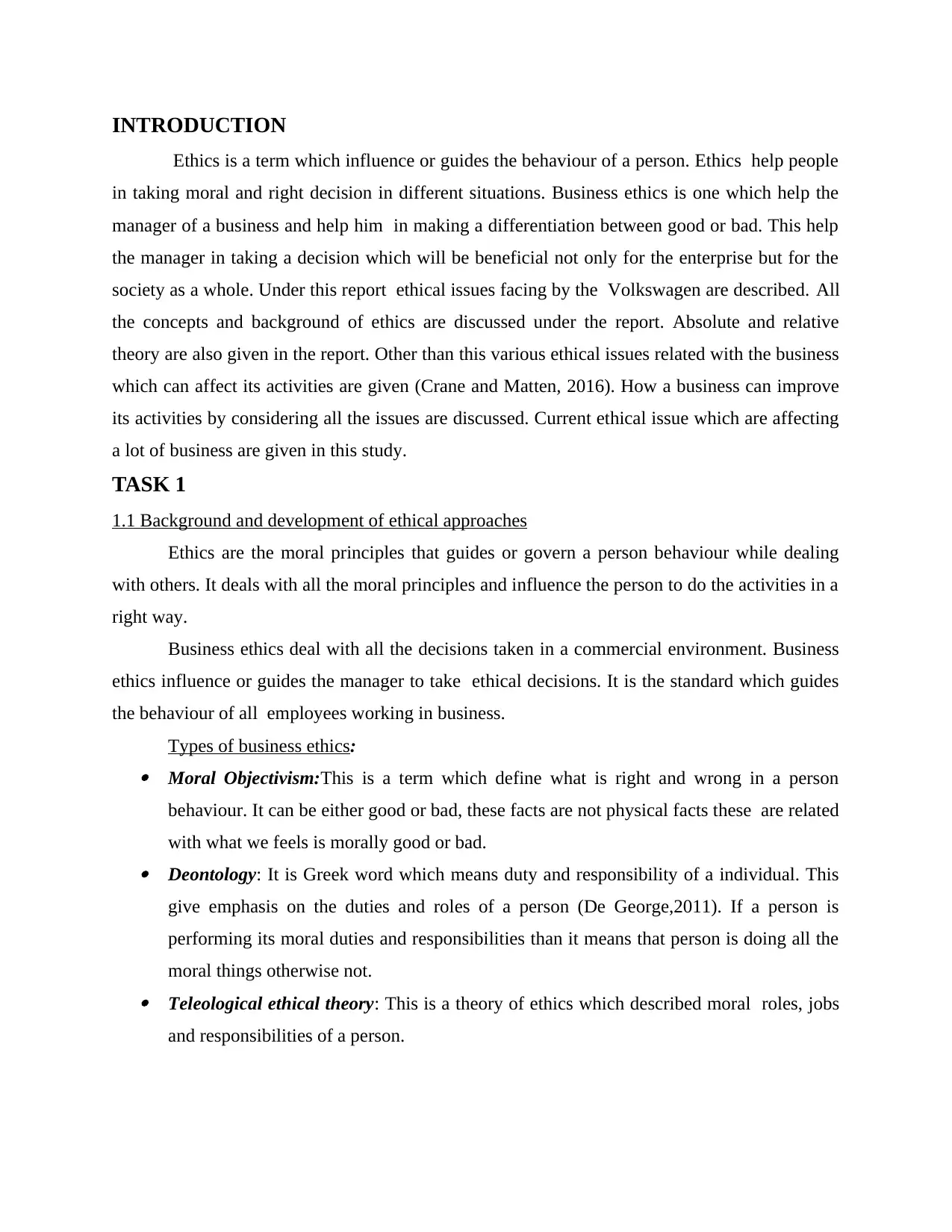
INTRODUCTION
Ethics is a term which influence or guides the behaviour of a person. Ethics help people
in taking moral and right decision in different situations. Business ethics is one which help the
manager of a business and help him in making a differentiation between good or bad. This help
the manager in taking a decision which will be beneficial not only for the enterprise but for the
society as a whole. Under this report ethical issues facing by the Volkswagen are described. All
the concepts and background of ethics are discussed under the report. Absolute and relative
theory are also given in the report. Other than this various ethical issues related with the business
which can affect its activities are given (Crane and Matten, 2016). How a business can improve
its activities by considering all the issues are discussed. Current ethical issue which are affecting
a lot of business are given in this study.
TASK 1
1.1 Background and development of ethical approaches
Ethics are the moral principles that guides or govern a person behaviour while dealing
with others. It deals with all the moral principles and influence the person to do the activities in a
right way.
Business ethics deal with all the decisions taken in a commercial environment. Business
ethics influence or guides the manager to take ethical decisions. It is the standard which guides
the behaviour of all employees working in business.
Types of business ethics: Moral Objectivism:This is a term which define what is right and wrong in a person
behaviour. It can be either good or bad, these facts are not physical facts these are related
with what we feels is morally good or bad. Deontology: It is Greek word which means duty and responsibility of a individual. This
give emphasis on the duties and roles of a person (De George,2011). If a person is
performing its moral duties and responsibilities than it means that person is doing all the
moral things otherwise not. Teleological ethical theory: This is a theory of ethics which described moral roles, jobs
and responsibilities of a person.
Ethics is a term which influence or guides the behaviour of a person. Ethics help people
in taking moral and right decision in different situations. Business ethics is one which help the
manager of a business and help him in making a differentiation between good or bad. This help
the manager in taking a decision which will be beneficial not only for the enterprise but for the
society as a whole. Under this report ethical issues facing by the Volkswagen are described. All
the concepts and background of ethics are discussed under the report. Absolute and relative
theory are also given in the report. Other than this various ethical issues related with the business
which can affect its activities are given (Crane and Matten, 2016). How a business can improve
its activities by considering all the issues are discussed. Current ethical issue which are affecting
a lot of business are given in this study.
TASK 1
1.1 Background and development of ethical approaches
Ethics are the moral principles that guides or govern a person behaviour while dealing
with others. It deals with all the moral principles and influence the person to do the activities in a
right way.
Business ethics deal with all the decisions taken in a commercial environment. Business
ethics influence or guides the manager to take ethical decisions. It is the standard which guides
the behaviour of all employees working in business.
Types of business ethics: Moral Objectivism:This is a term which define what is right and wrong in a person
behaviour. It can be either good or bad, these facts are not physical facts these are related
with what we feels is morally good or bad. Deontology: It is Greek word which means duty and responsibility of a individual. This
give emphasis on the duties and roles of a person (De George,2011). If a person is
performing its moral duties and responsibilities than it means that person is doing all the
moral things otherwise not. Teleological ethical theory: This is a theory of ethics which described moral roles, jobs
and responsibilities of a person.
⊘ This is a preview!⊘
Do you want full access?
Subscribe today to unlock all pages.

Trusted by 1+ million students worldwide
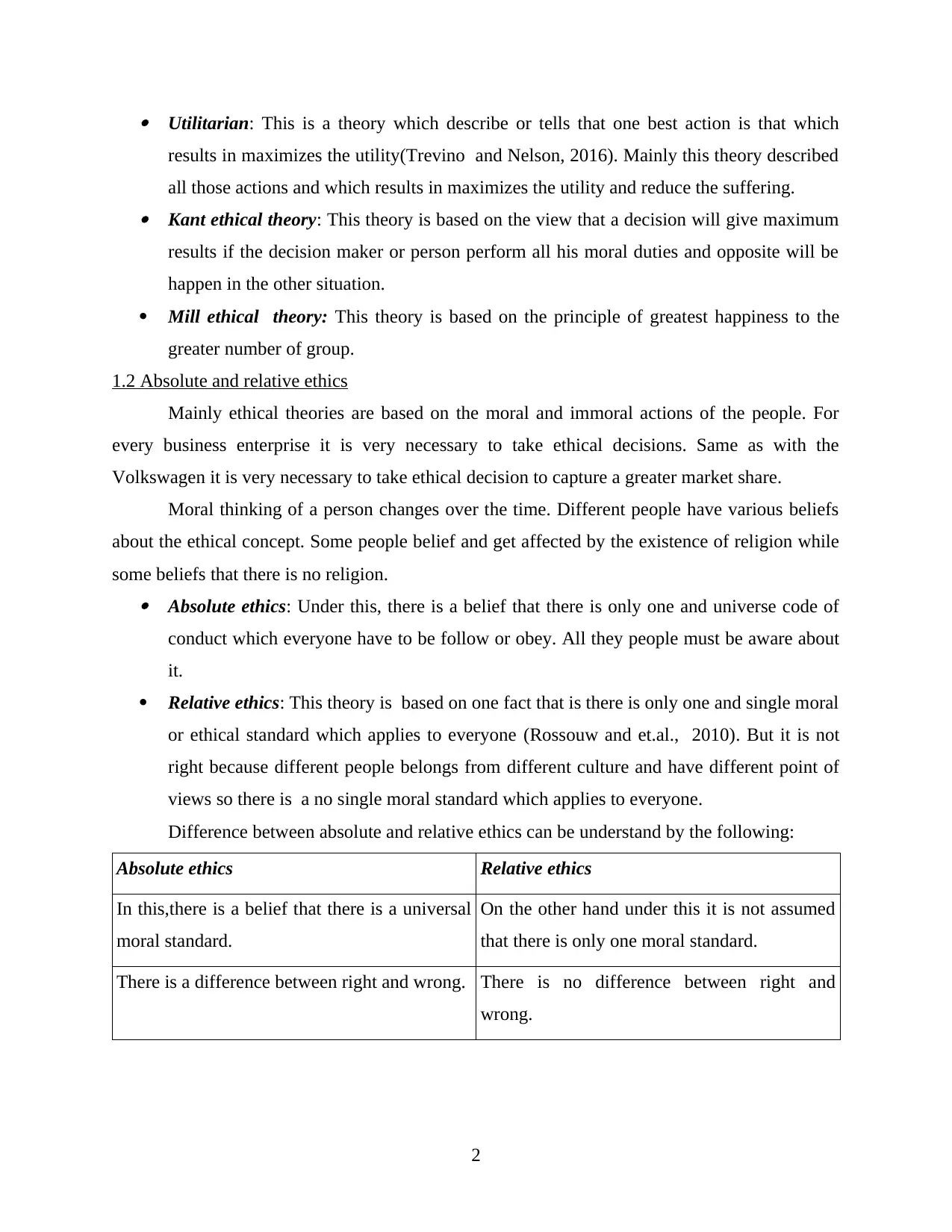
Utilitarian: This is a theory which describe or tells that one best action is that which
results in maximizes the utility(Trevino and Nelson, 2016). Mainly this theory described
all those actions and which results in maximizes the utility and reduce the suffering. Kant ethical theory: This theory is based on the view that a decision will give maximum
results if the decision maker or person perform all his moral duties and opposite will be
happen in the other situation.
Mill ethical theory: This theory is based on the principle of greatest happiness to the
greater number of group.
1.2 Absolute and relative ethics
Mainly ethical theories are based on the moral and immoral actions of the people. For
every business enterprise it is very necessary to take ethical decisions. Same as with the
Volkswagen it is very necessary to take ethical decision to capture a greater market share.
Moral thinking of a person changes over the time. Different people have various beliefs
about the ethical concept. Some people belief and get affected by the existence of religion while
some beliefs that there is no religion. Absolute ethics: Under this, there is a belief that there is only one and universe code of
conduct which everyone have to be follow or obey. All they people must be aware about
it.
Relative ethics: This theory is based on one fact that is there is only one and single moral
or ethical standard which applies to everyone (Rossouw and et.al., 2010). But it is not
right because different people belongs from different culture and have different point of
views so there is a no single moral standard which applies to everyone.
Difference between absolute and relative ethics can be understand by the following:
Absolute ethics Relative ethics
In this,there is a belief that there is a universal
moral standard.
On the other hand under this it is not assumed
that there is only one moral standard.
There is a difference between right and wrong. There is no difference between right and
wrong.
2
results in maximizes the utility(Trevino and Nelson, 2016). Mainly this theory described
all those actions and which results in maximizes the utility and reduce the suffering. Kant ethical theory: This theory is based on the view that a decision will give maximum
results if the decision maker or person perform all his moral duties and opposite will be
happen in the other situation.
Mill ethical theory: This theory is based on the principle of greatest happiness to the
greater number of group.
1.2 Absolute and relative ethics
Mainly ethical theories are based on the moral and immoral actions of the people. For
every business enterprise it is very necessary to take ethical decisions. Same as with the
Volkswagen it is very necessary to take ethical decision to capture a greater market share.
Moral thinking of a person changes over the time. Different people have various beliefs
about the ethical concept. Some people belief and get affected by the existence of religion while
some beliefs that there is no religion. Absolute ethics: Under this, there is a belief that there is only one and universe code of
conduct which everyone have to be follow or obey. All they people must be aware about
it.
Relative ethics: This theory is based on one fact that is there is only one and single moral
or ethical standard which applies to everyone (Rossouw and et.al., 2010). But it is not
right because different people belongs from different culture and have different point of
views so there is a no single moral standard which applies to everyone.
Difference between absolute and relative ethics can be understand by the following:
Absolute ethics Relative ethics
In this,there is a belief that there is a universal
moral standard.
On the other hand under this it is not assumed
that there is only one moral standard.
There is a difference between right and wrong. There is no difference between right and
wrong.
2
Paraphrase This Document
Need a fresh take? Get an instant paraphrase of this document with our AI Paraphraser
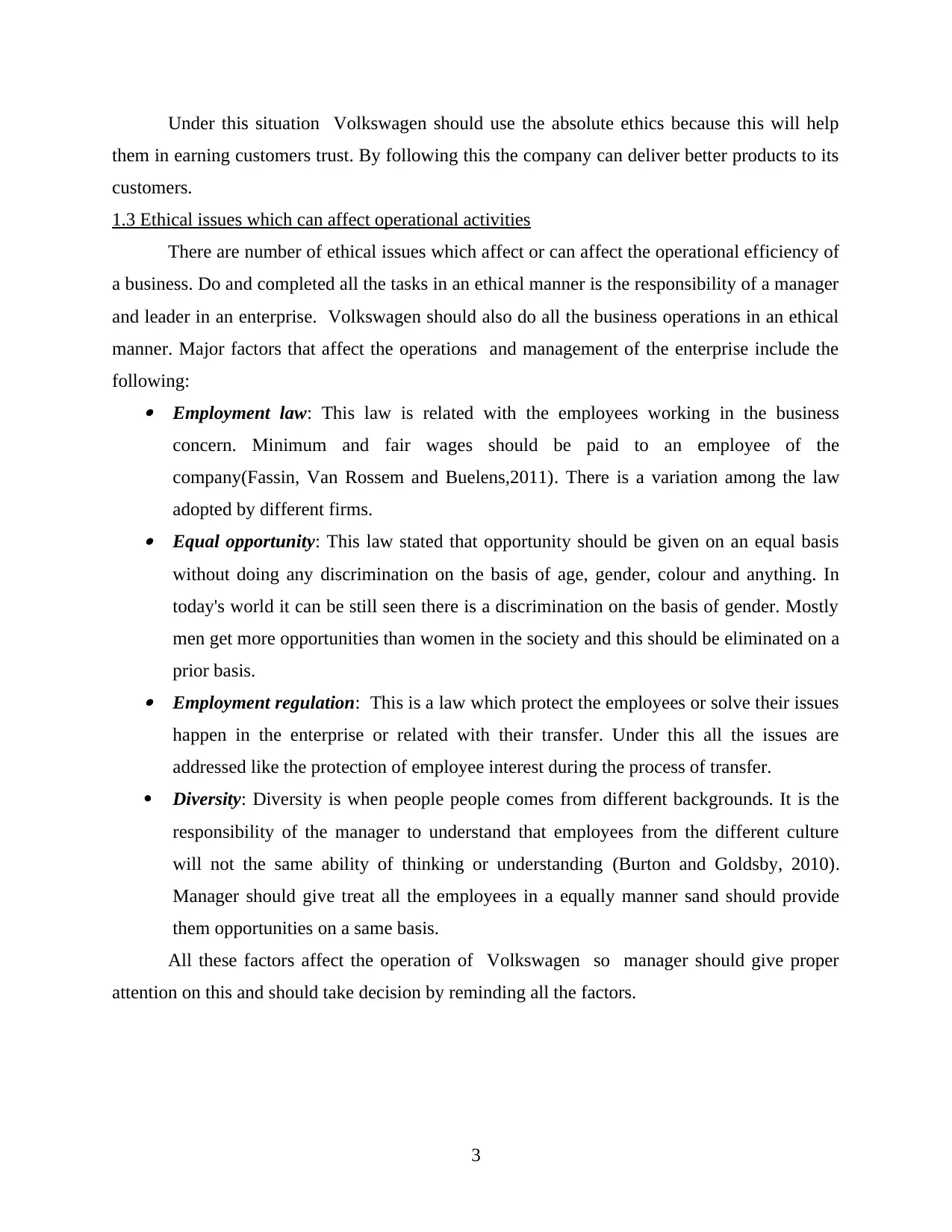
Under this situation Volkswagen should use the absolute ethics because this will help
them in earning customers trust. By following this the company can deliver better products to its
customers.
1.3 Ethical issues which can affect operational activities
There are number of ethical issues which affect or can affect the operational efficiency of
a business. Do and completed all the tasks in an ethical manner is the responsibility of a manager
and leader in an enterprise. Volkswagen should also do all the business operations in an ethical
manner. Major factors that affect the operations and management of the enterprise include the
following: Employment law: This law is related with the employees working in the business
concern. Minimum and fair wages should be paid to an employee of the
company(Fassin, Van Rossem and Buelens,2011). There is a variation among the law
adopted by different firms. Equal opportunity: This law stated that opportunity should be given on an equal basis
without doing any discrimination on the basis of age, gender, colour and anything. In
today's world it can be still seen there is a discrimination on the basis of gender. Mostly
men get more opportunities than women in the society and this should be eliminated on a
prior basis. Employment regulation: This is a law which protect the employees or solve their issues
happen in the enterprise or related with their transfer. Under this all the issues are
addressed like the protection of employee interest during the process of transfer.
Diversity: Diversity is when people people comes from different backgrounds. It is the
responsibility of the manager to understand that employees from the different culture
will not the same ability of thinking or understanding (Burton and Goldsby, 2010).
Manager should give treat all the employees in a equally manner sand should provide
them opportunities on a same basis.
All these factors affect the operation of Volkswagen so manager should give proper
attention on this and should take decision by reminding all the factors.
3
them in earning customers trust. By following this the company can deliver better products to its
customers.
1.3 Ethical issues which can affect operational activities
There are number of ethical issues which affect or can affect the operational efficiency of
a business. Do and completed all the tasks in an ethical manner is the responsibility of a manager
and leader in an enterprise. Volkswagen should also do all the business operations in an ethical
manner. Major factors that affect the operations and management of the enterprise include the
following: Employment law: This law is related with the employees working in the business
concern. Minimum and fair wages should be paid to an employee of the
company(Fassin, Van Rossem and Buelens,2011). There is a variation among the law
adopted by different firms. Equal opportunity: This law stated that opportunity should be given on an equal basis
without doing any discrimination on the basis of age, gender, colour and anything. In
today's world it can be still seen there is a discrimination on the basis of gender. Mostly
men get more opportunities than women in the society and this should be eliminated on a
prior basis. Employment regulation: This is a law which protect the employees or solve their issues
happen in the enterprise or related with their transfer. Under this all the issues are
addressed like the protection of employee interest during the process of transfer.
Diversity: Diversity is when people people comes from different backgrounds. It is the
responsibility of the manager to understand that employees from the different culture
will not the same ability of thinking or understanding (Burton and Goldsby, 2010).
Manager should give treat all the employees in a equally manner sand should provide
them opportunities on a same basis.
All these factors affect the operation of Volkswagen so manager should give proper
attention on this and should take decision by reminding all the factors.
3
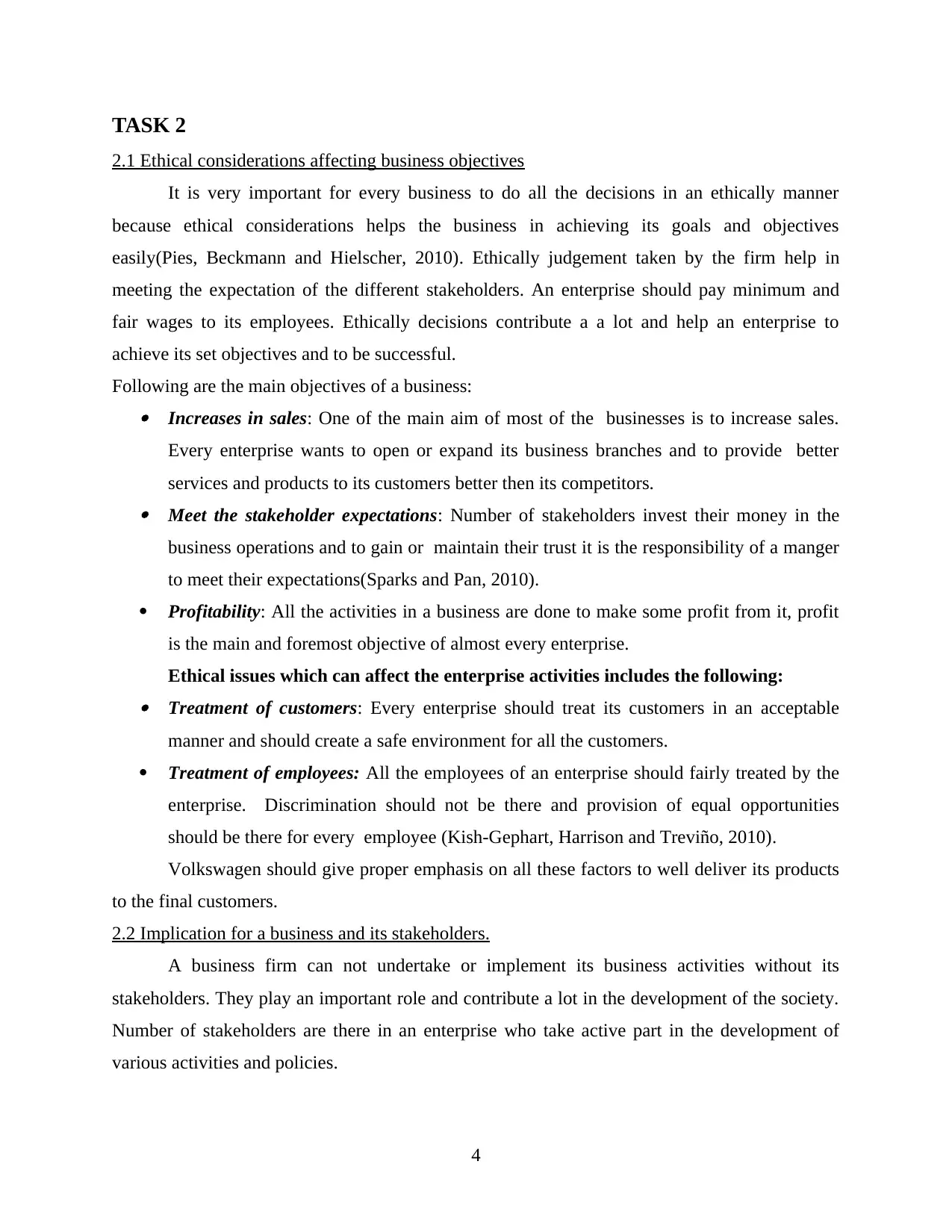
TASK 2
2.1 Ethical considerations affecting business objectives
It is very important for every business to do all the decisions in an ethically manner
because ethical considerations helps the business in achieving its goals and objectives
easily(Pies, Beckmann and Hielscher, 2010). Ethically judgement taken by the firm help in
meeting the expectation of the different stakeholders. An enterprise should pay minimum and
fair wages to its employees. Ethically decisions contribute a a lot and help an enterprise to
achieve its set objectives and to be successful.
Following are the main objectives of a business: Increases in sales: One of the main aim of most of the businesses is to increase sales.
Every enterprise wants to open or expand its business branches and to provide better
services and products to its customers better then its competitors. Meet the stakeholder expectations: Number of stakeholders invest their money in the
business operations and to gain or maintain their trust it is the responsibility of a manger
to meet their expectations(Sparks and Pan, 2010).
Profitability: All the activities in a business are done to make some profit from it, profit
is the main and foremost objective of almost every enterprise.
Ethical issues which can affect the enterprise activities includes the following: Treatment of customers: Every enterprise should treat its customers in an acceptable
manner and should create a safe environment for all the customers.
Treatment of employees: All the employees of an enterprise should fairly treated by the
enterprise. Discrimination should not be there and provision of equal opportunities
should be there for every employee (Kish-Gephart, Harrison and Treviño, 2010).
Volkswagen should give proper emphasis on all these factors to well deliver its products
to the final customers.
2.2 Implication for a business and its stakeholders.
A business firm can not undertake or implement its business activities without its
stakeholders. They play an important role and contribute a lot in the development of the society.
Number of stakeholders are there in an enterprise who take active part in the development of
various activities and policies.
4
2.1 Ethical considerations affecting business objectives
It is very important for every business to do all the decisions in an ethically manner
because ethical considerations helps the business in achieving its goals and objectives
easily(Pies, Beckmann and Hielscher, 2010). Ethically judgement taken by the firm help in
meeting the expectation of the different stakeholders. An enterprise should pay minimum and
fair wages to its employees. Ethically decisions contribute a a lot and help an enterprise to
achieve its set objectives and to be successful.
Following are the main objectives of a business: Increases in sales: One of the main aim of most of the businesses is to increase sales.
Every enterprise wants to open or expand its business branches and to provide better
services and products to its customers better then its competitors. Meet the stakeholder expectations: Number of stakeholders invest their money in the
business operations and to gain or maintain their trust it is the responsibility of a manger
to meet their expectations(Sparks and Pan, 2010).
Profitability: All the activities in a business are done to make some profit from it, profit
is the main and foremost objective of almost every enterprise.
Ethical issues which can affect the enterprise activities includes the following: Treatment of customers: Every enterprise should treat its customers in an acceptable
manner and should create a safe environment for all the customers.
Treatment of employees: All the employees of an enterprise should fairly treated by the
enterprise. Discrimination should not be there and provision of equal opportunities
should be there for every employee (Kish-Gephart, Harrison and Treviño, 2010).
Volkswagen should give proper emphasis on all these factors to well deliver its products
to the final customers.
2.2 Implication for a business and its stakeholders.
A business firm can not undertake or implement its business activities without its
stakeholders. They play an important role and contribute a lot in the development of the society.
Number of stakeholders are there in an enterprise who take active part in the development of
various activities and policies.
4
⊘ This is a preview!⊘
Do you want full access?
Subscribe today to unlock all pages.

Trusted by 1+ million students worldwide
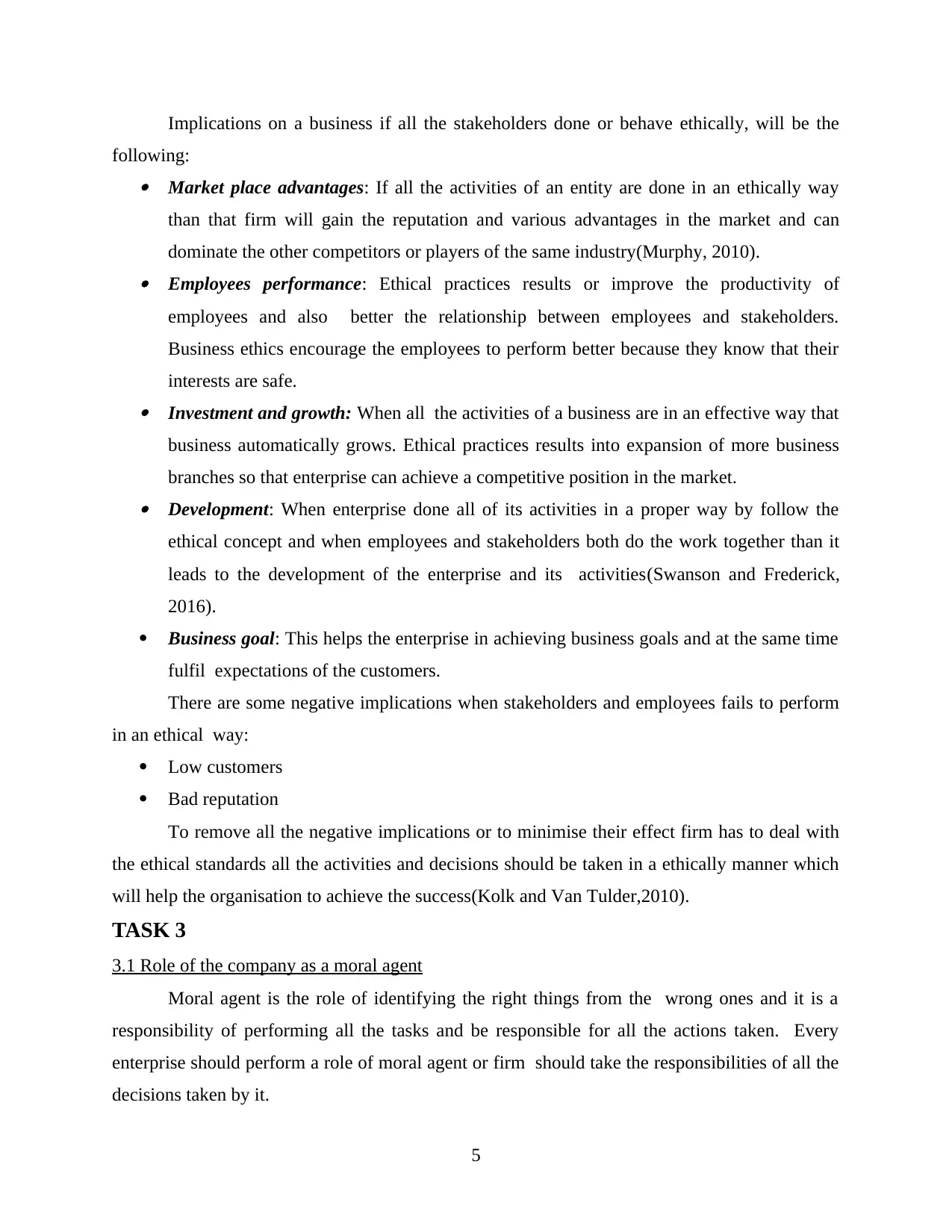
Implications on a business if all the stakeholders done or behave ethically, will be the
following: Market place advantages: If all the activities of an entity are done in an ethically way
than that firm will gain the reputation and various advantages in the market and can
dominate the other competitors or players of the same industry(Murphy, 2010). Employees performance: Ethical practices results or improve the productivity of
employees and also better the relationship between employees and stakeholders.
Business ethics encourage the employees to perform better because they know that their
interests are safe. Investment and growth: When all the activities of a business are in an effective way that
business automatically grows. Ethical practices results into expansion of more business
branches so that enterprise can achieve a competitive position in the market. Development: When enterprise done all of its activities in a proper way by follow the
ethical concept and when employees and stakeholders both do the work together than it
leads to the development of the enterprise and its activities(Swanson and Frederick,
2016).
Business goal: This helps the enterprise in achieving business goals and at the same time
fulfil expectations of the customers.
There are some negative implications when stakeholders and employees fails to perform
in an ethical way:
Low customers
Bad reputation
To remove all the negative implications or to minimise their effect firm has to deal with
the ethical standards all the activities and decisions should be taken in a ethically manner which
will help the organisation to achieve the success(Kolk and Van Tulder,2010).
TASK 3
3.1 Role of the company as a moral agent
Moral agent is the role of identifying the right things from the wrong ones and it is a
responsibility of performing all the tasks and be responsible for all the actions taken. Every
enterprise should perform a role of moral agent or firm should take the responsibilities of all the
decisions taken by it.
5
following: Market place advantages: If all the activities of an entity are done in an ethically way
than that firm will gain the reputation and various advantages in the market and can
dominate the other competitors or players of the same industry(Murphy, 2010). Employees performance: Ethical practices results or improve the productivity of
employees and also better the relationship between employees and stakeholders.
Business ethics encourage the employees to perform better because they know that their
interests are safe. Investment and growth: When all the activities of a business are in an effective way that
business automatically grows. Ethical practices results into expansion of more business
branches so that enterprise can achieve a competitive position in the market. Development: When enterprise done all of its activities in a proper way by follow the
ethical concept and when employees and stakeholders both do the work together than it
leads to the development of the enterprise and its activities(Swanson and Frederick,
2016).
Business goal: This helps the enterprise in achieving business goals and at the same time
fulfil expectations of the customers.
There are some negative implications when stakeholders and employees fails to perform
in an ethical way:
Low customers
Bad reputation
To remove all the negative implications or to minimise their effect firm has to deal with
the ethical standards all the activities and decisions should be taken in a ethically manner which
will help the organisation to achieve the success(Kolk and Van Tulder,2010).
TASK 3
3.1 Role of the company as a moral agent
Moral agent is the role of identifying the right things from the wrong ones and it is a
responsibility of performing all the tasks and be responsible for all the actions taken. Every
enterprise should perform a role of moral agent or firm should take the responsibilities of all the
decisions taken by it.
5
Paraphrase This Document
Need a fresh take? Get an instant paraphrase of this document with our AI Paraphraser
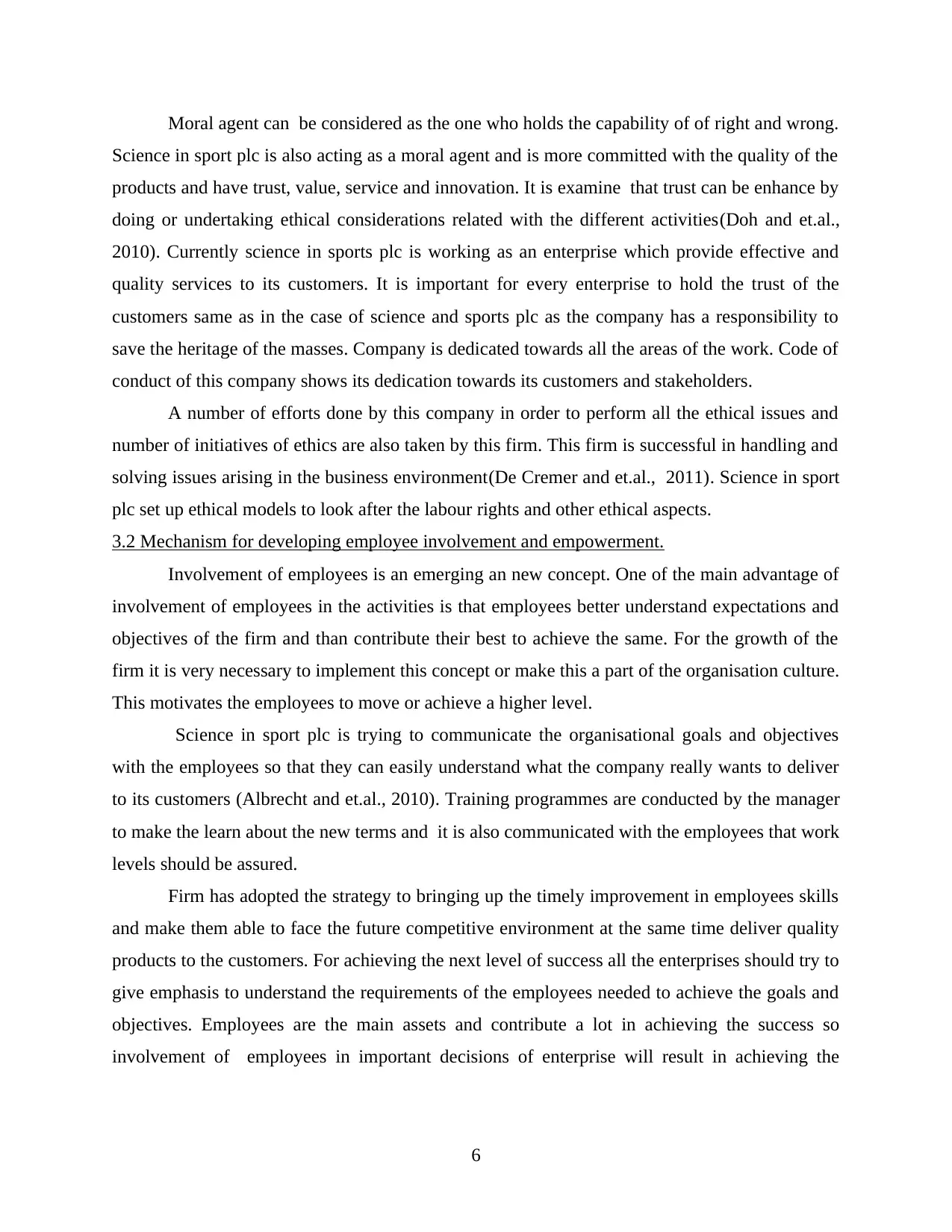
Moral agent can be considered as the one who holds the capability of of right and wrong.
Science in sport plc is also acting as a moral agent and is more committed with the quality of the
products and have trust, value, service and innovation. It is examine that trust can be enhance by
doing or undertaking ethical considerations related with the different activities(Doh and et.al.,
2010). Currently science in sports plc is working as an enterprise which provide effective and
quality services to its customers. It is important for every enterprise to hold the trust of the
customers same as in the case of science and sports plc as the company has a responsibility to
save the heritage of the masses. Company is dedicated towards all the areas of the work. Code of
conduct of this company shows its dedication towards its customers and stakeholders.
A number of efforts done by this company in order to perform all the ethical issues and
number of initiatives of ethics are also taken by this firm. This firm is successful in handling and
solving issues arising in the business environment(De Cremer and et.al., 2011). Science in sport
plc set up ethical models to look after the labour rights and other ethical aspects.
3.2 Mechanism for developing employee involvement and empowerment.
Involvement of employees is an emerging an new concept. One of the main advantage of
involvement of employees in the activities is that employees better understand expectations and
objectives of the firm and than contribute their best to achieve the same. For the growth of the
firm it is very necessary to implement this concept or make this a part of the organisation culture.
This motivates the employees to move or achieve a higher level.
Science in sport plc is trying to communicate the organisational goals and objectives
with the employees so that they can easily understand what the company really wants to deliver
to its customers (Albrecht and et.al., 2010). Training programmes are conducted by the manager
to make the learn about the new terms and it is also communicated with the employees that work
levels should be assured.
Firm has adopted the strategy to bringing up the timely improvement in employees skills
and make them able to face the future competitive environment at the same time deliver quality
products to the customers. For achieving the next level of success all the enterprises should try to
give emphasis to understand the requirements of the employees needed to achieve the goals and
objectives. Employees are the main assets and contribute a lot in achieving the success so
involvement of employees in important decisions of enterprise will result in achieving the
6
Science in sport plc is also acting as a moral agent and is more committed with the quality of the
products and have trust, value, service and innovation. It is examine that trust can be enhance by
doing or undertaking ethical considerations related with the different activities(Doh and et.al.,
2010). Currently science in sports plc is working as an enterprise which provide effective and
quality services to its customers. It is important for every enterprise to hold the trust of the
customers same as in the case of science and sports plc as the company has a responsibility to
save the heritage of the masses. Company is dedicated towards all the areas of the work. Code of
conduct of this company shows its dedication towards its customers and stakeholders.
A number of efforts done by this company in order to perform all the ethical issues and
number of initiatives of ethics are also taken by this firm. This firm is successful in handling and
solving issues arising in the business environment(De Cremer and et.al., 2011). Science in sport
plc set up ethical models to look after the labour rights and other ethical aspects.
3.2 Mechanism for developing employee involvement and empowerment.
Involvement of employees is an emerging an new concept. One of the main advantage of
involvement of employees in the activities is that employees better understand expectations and
objectives of the firm and than contribute their best to achieve the same. For the growth of the
firm it is very necessary to implement this concept or make this a part of the organisation culture.
This motivates the employees to move or achieve a higher level.
Science in sport plc is trying to communicate the organisational goals and objectives
with the employees so that they can easily understand what the company really wants to deliver
to its customers (Albrecht and et.al., 2010). Training programmes are conducted by the manager
to make the learn about the new terms and it is also communicated with the employees that work
levels should be assured.
Firm has adopted the strategy to bringing up the timely improvement in employees skills
and make them able to face the future competitive environment at the same time deliver quality
products to the customers. For achieving the next level of success all the enterprises should try to
give emphasis to understand the requirements of the employees needed to achieve the goals and
objectives. Employees are the main assets and contribute a lot in achieving the success so
involvement of employees in important decisions of enterprise will result in achieving the
6
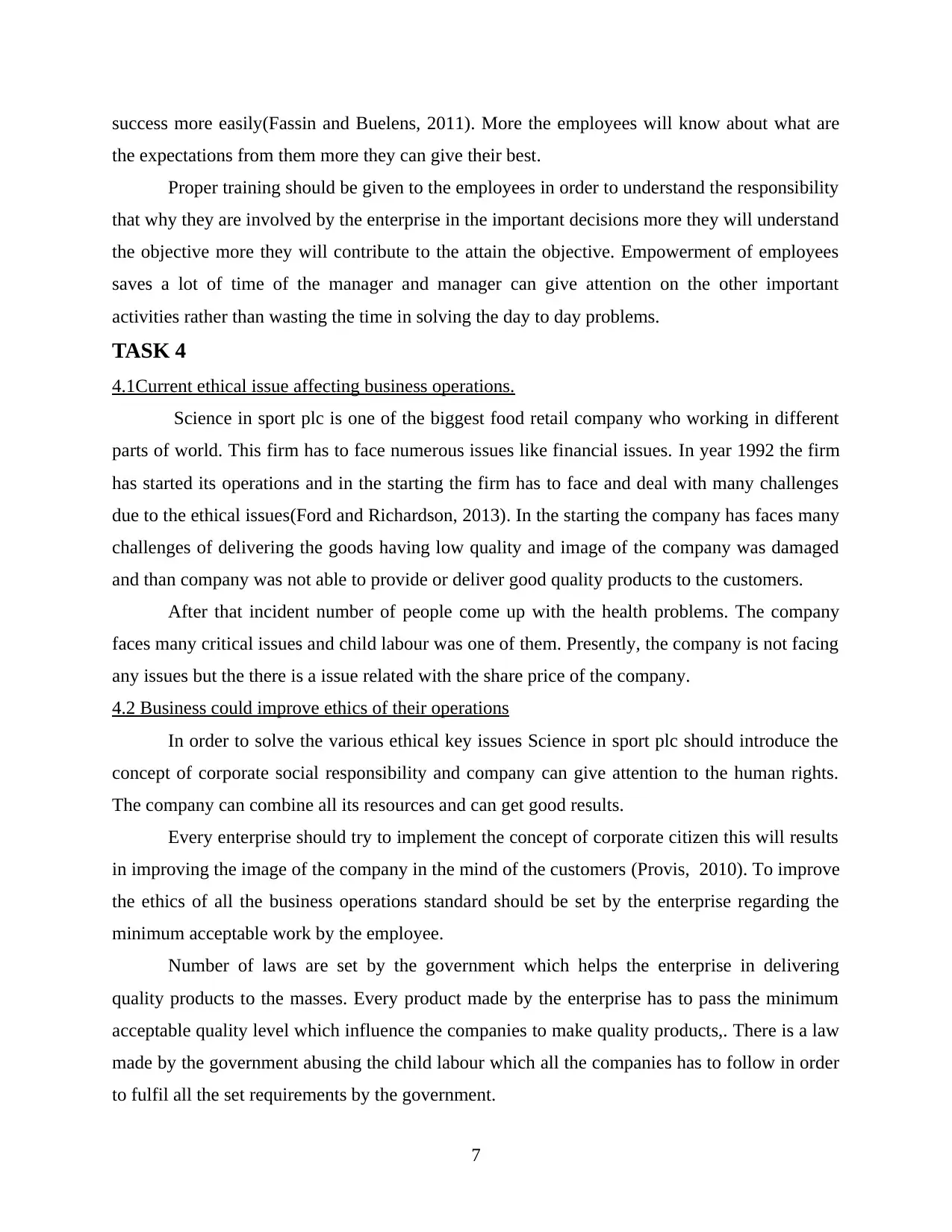
success more easily(Fassin and Buelens, 2011). More the employees will know about what are
the expectations from them more they can give their best.
Proper training should be given to the employees in order to understand the responsibility
that why they are involved by the enterprise in the important decisions more they will understand
the objective more they will contribute to the attain the objective. Empowerment of employees
saves a lot of time of the manager and manager can give attention on the other important
activities rather than wasting the time in solving the day to day problems.
TASK 4
4.1Current ethical issue affecting business operations.
Science in sport plc is one of the biggest food retail company who working in different
parts of world. This firm has to face numerous issues like financial issues. In year 1992 the firm
has started its operations and in the starting the firm has to face and deal with many challenges
due to the ethical issues(Ford and Richardson, 2013). In the starting the company has faces many
challenges of delivering the goods having low quality and image of the company was damaged
and than company was not able to provide or deliver good quality products to the customers.
After that incident number of people come up with the health problems. The company
faces many critical issues and child labour was one of them. Presently, the company is not facing
any issues but the there is a issue related with the share price of the company.
4.2 Business could improve ethics of their operations
In order to solve the various ethical key issues Science in sport plc should introduce the
concept of corporate social responsibility and company can give attention to the human rights.
The company can combine all its resources and can get good results.
Every enterprise should try to implement the concept of corporate citizen this will results
in improving the image of the company in the mind of the customers (Provis, 2010). To improve
the ethics of all the business operations standard should be set by the enterprise regarding the
minimum acceptable work by the employee.
Number of laws are set by the government which helps the enterprise in delivering
quality products to the masses. Every product made by the enterprise has to pass the minimum
acceptable quality level which influence the companies to make quality products,. There is a law
made by the government abusing the child labour which all the companies has to follow in order
to fulfil all the set requirements by the government.
7
the expectations from them more they can give their best.
Proper training should be given to the employees in order to understand the responsibility
that why they are involved by the enterprise in the important decisions more they will understand
the objective more they will contribute to the attain the objective. Empowerment of employees
saves a lot of time of the manager and manager can give attention on the other important
activities rather than wasting the time in solving the day to day problems.
TASK 4
4.1Current ethical issue affecting business operations.
Science in sport plc is one of the biggest food retail company who working in different
parts of world. This firm has to face numerous issues like financial issues. In year 1992 the firm
has started its operations and in the starting the firm has to face and deal with many challenges
due to the ethical issues(Ford and Richardson, 2013). In the starting the company has faces many
challenges of delivering the goods having low quality and image of the company was damaged
and than company was not able to provide or deliver good quality products to the customers.
After that incident number of people come up with the health problems. The company
faces many critical issues and child labour was one of them. Presently, the company is not facing
any issues but the there is a issue related with the share price of the company.
4.2 Business could improve ethics of their operations
In order to solve the various ethical key issues Science in sport plc should introduce the
concept of corporate social responsibility and company can give attention to the human rights.
The company can combine all its resources and can get good results.
Every enterprise should try to implement the concept of corporate citizen this will results
in improving the image of the company in the mind of the customers (Provis, 2010). To improve
the ethics of all the business operations standard should be set by the enterprise regarding the
minimum acceptable work by the employee.
Number of laws are set by the government which helps the enterprise in delivering
quality products to the masses. Every product made by the enterprise has to pass the minimum
acceptable quality level which influence the companies to make quality products,. There is a law
made by the government abusing the child labour which all the companies has to follow in order
to fulfil all the set requirements by the government.
7
⊘ This is a preview!⊘
Do you want full access?
Subscribe today to unlock all pages.

Trusted by 1+ million students worldwide
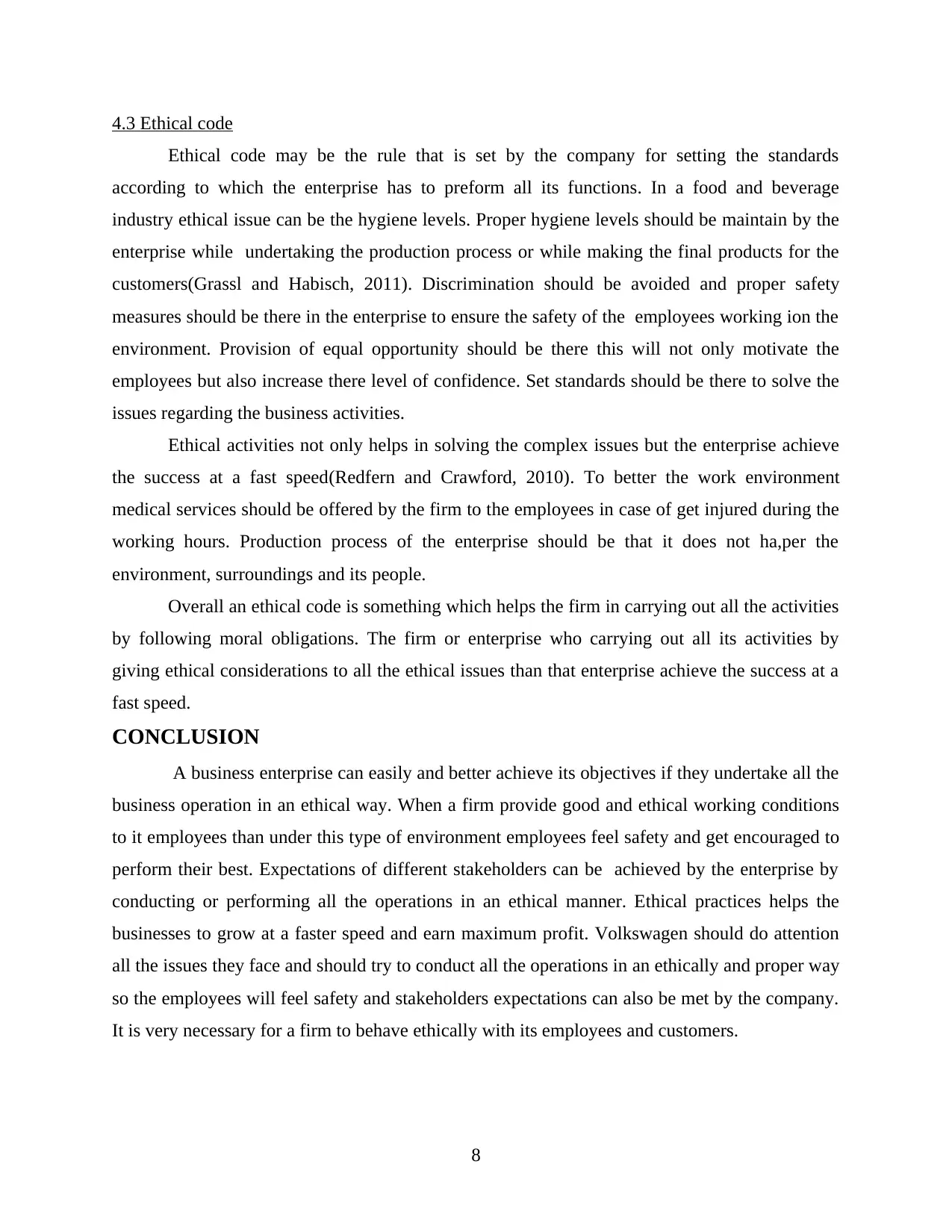
4.3 Ethical code
Ethical code may be the rule that is set by the company for setting the standards
according to which the enterprise has to preform all its functions. In a food and beverage
industry ethical issue can be the hygiene levels. Proper hygiene levels should be maintain by the
enterprise while undertaking the production process or while making the final products for the
customers(Grassl and Habisch, 2011). Discrimination should be avoided and proper safety
measures should be there in the enterprise to ensure the safety of the employees working ion the
environment. Provision of equal opportunity should be there this will not only motivate the
employees but also increase there level of confidence. Set standards should be there to solve the
issues regarding the business activities.
Ethical activities not only helps in solving the complex issues but the enterprise achieve
the success at a fast speed(Redfern and Crawford, 2010). To better the work environment
medical services should be offered by the firm to the employees in case of get injured during the
working hours. Production process of the enterprise should be that it does not ha,per the
environment, surroundings and its people.
Overall an ethical code is something which helps the firm in carrying out all the activities
by following moral obligations. The firm or enterprise who carrying out all its activities by
giving ethical considerations to all the ethical issues than that enterprise achieve the success at a
fast speed.
CONCLUSION
A business enterprise can easily and better achieve its objectives if they undertake all the
business operation in an ethical way. When a firm provide good and ethical working conditions
to it employees than under this type of environment employees feel safety and get encouraged to
perform their best. Expectations of different stakeholders can be achieved by the enterprise by
conducting or performing all the operations in an ethical manner. Ethical practices helps the
businesses to grow at a faster speed and earn maximum profit. Volkswagen should do attention
all the issues they face and should try to conduct all the operations in an ethically and proper way
so the employees will feel safety and stakeholders expectations can also be met by the company.
It is very necessary for a firm to behave ethically with its employees and customers.
8
Ethical code may be the rule that is set by the company for setting the standards
according to which the enterprise has to preform all its functions. In a food and beverage
industry ethical issue can be the hygiene levels. Proper hygiene levels should be maintain by the
enterprise while undertaking the production process or while making the final products for the
customers(Grassl and Habisch, 2011). Discrimination should be avoided and proper safety
measures should be there in the enterprise to ensure the safety of the employees working ion the
environment. Provision of equal opportunity should be there this will not only motivate the
employees but also increase there level of confidence. Set standards should be there to solve the
issues regarding the business activities.
Ethical activities not only helps in solving the complex issues but the enterprise achieve
the success at a fast speed(Redfern and Crawford, 2010). To better the work environment
medical services should be offered by the firm to the employees in case of get injured during the
working hours. Production process of the enterprise should be that it does not ha,per the
environment, surroundings and its people.
Overall an ethical code is something which helps the firm in carrying out all the activities
by following moral obligations. The firm or enterprise who carrying out all its activities by
giving ethical considerations to all the ethical issues than that enterprise achieve the success at a
fast speed.
CONCLUSION
A business enterprise can easily and better achieve its objectives if they undertake all the
business operation in an ethical way. When a firm provide good and ethical working conditions
to it employees than under this type of environment employees feel safety and get encouraged to
perform their best. Expectations of different stakeholders can be achieved by the enterprise by
conducting or performing all the operations in an ethical manner. Ethical practices helps the
businesses to grow at a faster speed and earn maximum profit. Volkswagen should do attention
all the issues they face and should try to conduct all the operations in an ethically and proper way
so the employees will feel safety and stakeholders expectations can also be met by the company.
It is very necessary for a firm to behave ethically with its employees and customers.
8
Paraphrase This Document
Need a fresh take? Get an instant paraphrase of this document with our AI Paraphraser
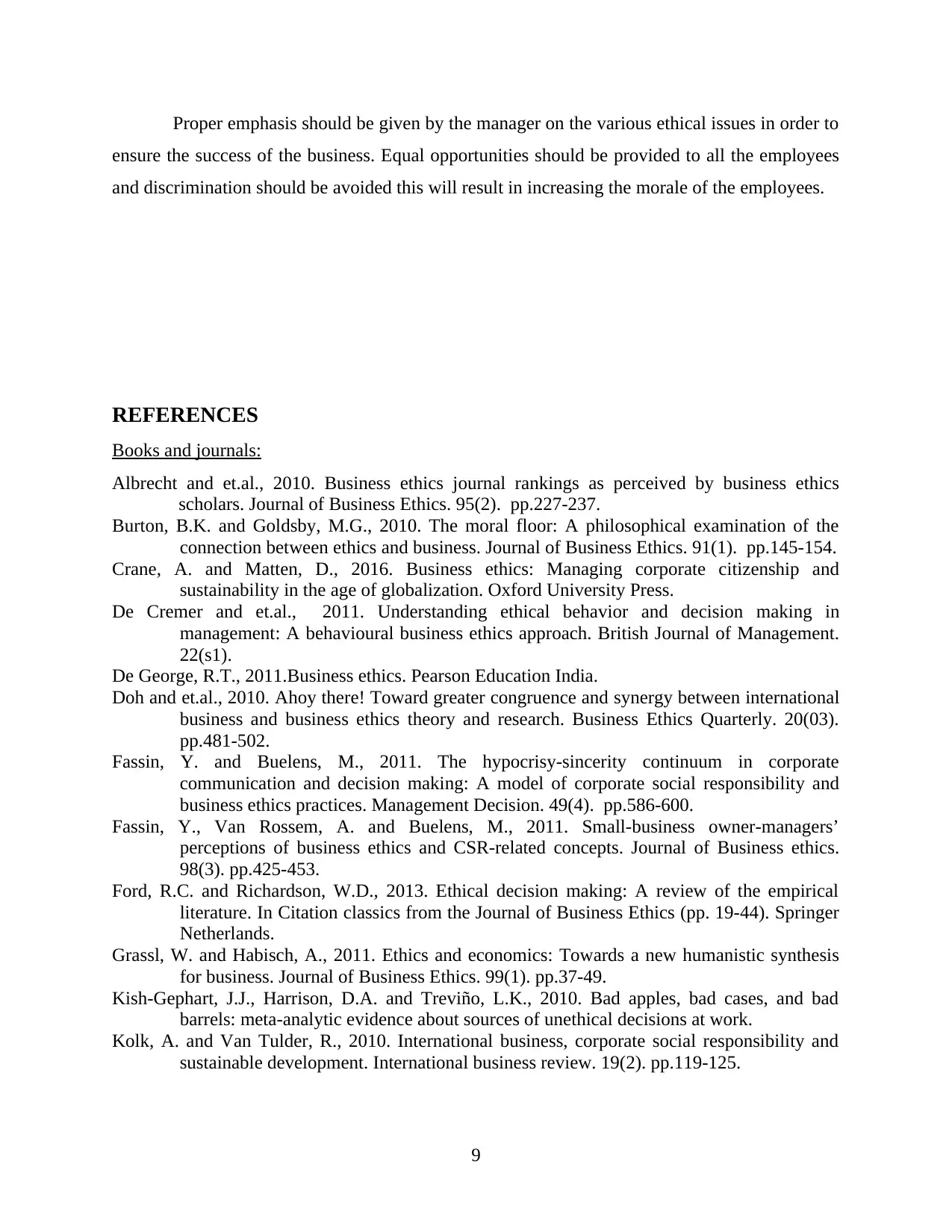
Proper emphasis should be given by the manager on the various ethical issues in order to
ensure the success of the business. Equal opportunities should be provided to all the employees
and discrimination should be avoided this will result in increasing the morale of the employees.
REFERENCES
Books and journals:
Albrecht and et.al., 2010. Business ethics journal rankings as perceived by business ethics
scholars. Journal of Business Ethics. 95(2). pp.227-237.
Burton, B.K. and Goldsby, M.G., 2010. The moral floor: A philosophical examination of the
connection between ethics and business. Journal of Business Ethics. 91(1). pp.145-154.
Crane, A. and Matten, D., 2016. Business ethics: Managing corporate citizenship and
sustainability in the age of globalization. Oxford University Press.
De Cremer and et.al., 2011. Understanding ethical behavior and decision making in
management: A behavioural business ethics approach. British Journal of Management.
22(s1).
De George, R.T., 2011.Business ethics. Pearson Education India.
Doh and et.al., 2010. Ahoy there! Toward greater congruence and synergy between international
business and business ethics theory and research. Business Ethics Quarterly. 20(03).
pp.481-502.
Fassin, Y. and Buelens, M., 2011. The hypocrisy-sincerity continuum in corporate
communication and decision making: A model of corporate social responsibility and
business ethics practices. Management Decision. 49(4). pp.586-600.
Fassin, Y., Van Rossem, A. and Buelens, M., 2011. Small-business owner-managers’
perceptions of business ethics and CSR-related concepts. Journal of Business ethics.
98(3). pp.425-453.
Ford, R.C. and Richardson, W.D., 2013. Ethical decision making: A review of the empirical
literature. In Citation classics from the Journal of Business Ethics (pp. 19-44). Springer
Netherlands.
Grassl, W. and Habisch, A., 2011. Ethics and economics: Towards a new humanistic synthesis
for business. Journal of Business Ethics. 99(1). pp.37-49.
Kish-Gephart, J.J., Harrison, D.A. and Treviño, L.K., 2010. Bad apples, bad cases, and bad
barrels: meta-analytic evidence about sources of unethical decisions at work.
Kolk, A. and Van Tulder, R., 2010. International business, corporate social responsibility and
sustainable development. International business review. 19(2). pp.119-125.
9
ensure the success of the business. Equal opportunities should be provided to all the employees
and discrimination should be avoided this will result in increasing the morale of the employees.
REFERENCES
Books and journals:
Albrecht and et.al., 2010. Business ethics journal rankings as perceived by business ethics
scholars. Journal of Business Ethics. 95(2). pp.227-237.
Burton, B.K. and Goldsby, M.G., 2010. The moral floor: A philosophical examination of the
connection between ethics and business. Journal of Business Ethics. 91(1). pp.145-154.
Crane, A. and Matten, D., 2016. Business ethics: Managing corporate citizenship and
sustainability in the age of globalization. Oxford University Press.
De Cremer and et.al., 2011. Understanding ethical behavior and decision making in
management: A behavioural business ethics approach. British Journal of Management.
22(s1).
De George, R.T., 2011.Business ethics. Pearson Education India.
Doh and et.al., 2010. Ahoy there! Toward greater congruence and synergy between international
business and business ethics theory and research. Business Ethics Quarterly. 20(03).
pp.481-502.
Fassin, Y. and Buelens, M., 2011. The hypocrisy-sincerity continuum in corporate
communication and decision making: A model of corporate social responsibility and
business ethics practices. Management Decision. 49(4). pp.586-600.
Fassin, Y., Van Rossem, A. and Buelens, M., 2011. Small-business owner-managers’
perceptions of business ethics and CSR-related concepts. Journal of Business ethics.
98(3). pp.425-453.
Ford, R.C. and Richardson, W.D., 2013. Ethical decision making: A review of the empirical
literature. In Citation classics from the Journal of Business Ethics (pp. 19-44). Springer
Netherlands.
Grassl, W. and Habisch, A., 2011. Ethics and economics: Towards a new humanistic synthesis
for business. Journal of Business Ethics. 99(1). pp.37-49.
Kish-Gephart, J.J., Harrison, D.A. and Treviño, L.K., 2010. Bad apples, bad cases, and bad
barrels: meta-analytic evidence about sources of unethical decisions at work.
Kolk, A. and Van Tulder, R., 2010. International business, corporate social responsibility and
sustainable development. International business review. 19(2). pp.119-125.
9
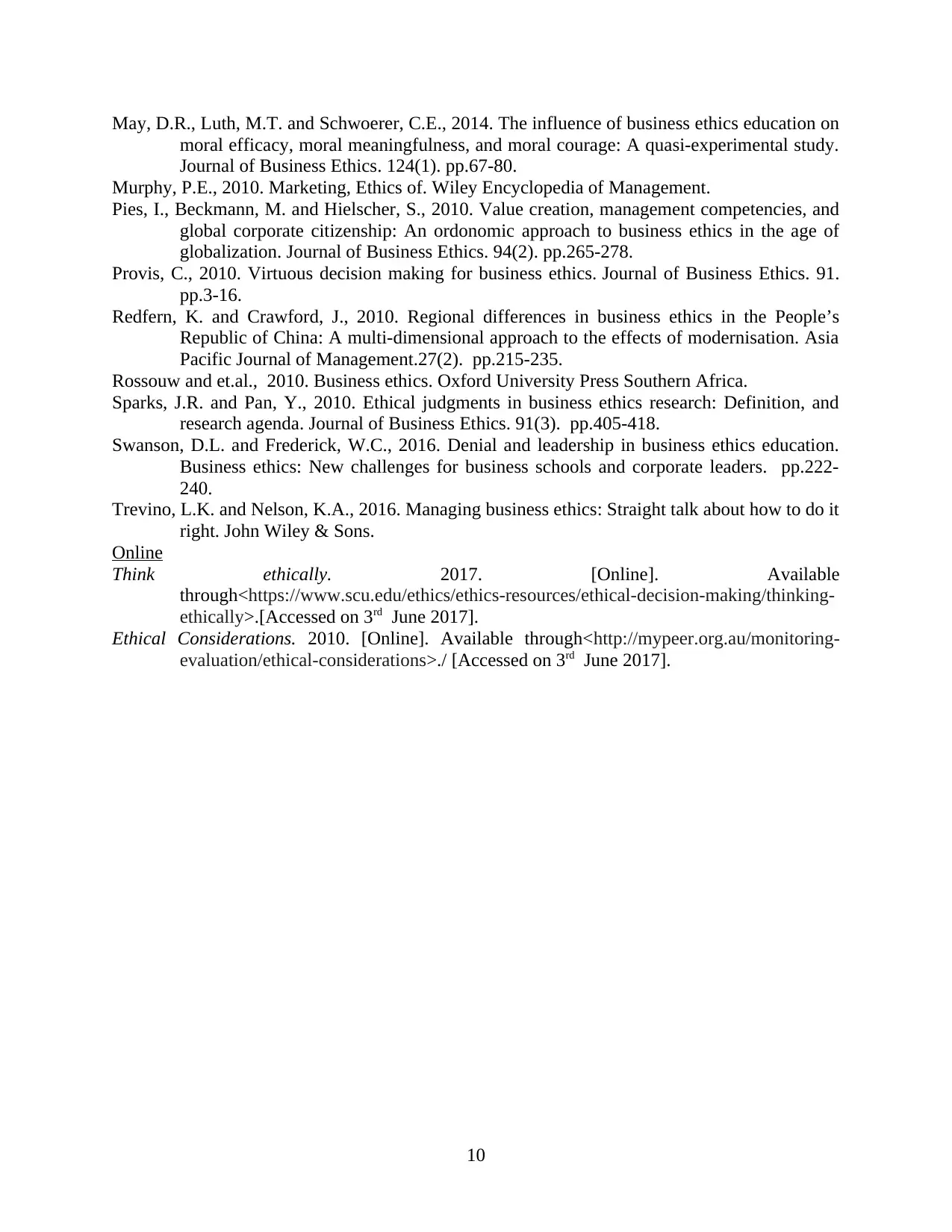
May, D.R., Luth, M.T. and Schwoerer, C.E., 2014. The influence of business ethics education on
moral efficacy, moral meaningfulness, and moral courage: A quasi-experimental study.
Journal of Business Ethics. 124(1). pp.67-80.
Murphy, P.E., 2010. Marketing, Ethics of. Wiley Encyclopedia of Management.
Pies, I., Beckmann, M. and Hielscher, S., 2010. Value creation, management competencies, and
global corporate citizenship: An ordonomic approach to business ethics in the age of
globalization. Journal of Business Ethics. 94(2). pp.265-278.
Provis, C., 2010. Virtuous decision making for business ethics. Journal of Business Ethics. 91.
pp.3-16.
Redfern, K. and Crawford, J., 2010. Regional differences in business ethics in the People’s
Republic of China: A multi-dimensional approach to the effects of modernisation. Asia
Pacific Journal of Management.27(2). pp.215-235.
Rossouw and et.al., 2010. Business ethics. Oxford University Press Southern Africa.
Sparks, J.R. and Pan, Y., 2010. Ethical judgments in business ethics research: Definition, and
research agenda. Journal of Business Ethics. 91(3). pp.405-418.
Swanson, D.L. and Frederick, W.C., 2016. Denial and leadership in business ethics education.
Business ethics: New challenges for business schools and corporate leaders. pp.222-
240.
Trevino, L.K. and Nelson, K.A., 2016. Managing business ethics: Straight talk about how to do it
right. John Wiley & Sons.
Online
Think ethically. 2017. [Online]. Available
through<https://www.scu.edu/ethics/ethics-resources/ethical-decision-making/thinking-
ethically>.[Accessed on 3rd June 2017].
Ethical Considerations. 2010. [Online]. Available through<http://mypeer.org.au/monitoring-
evaluation/ethical-considerations>./ [Accessed on 3rd June 2017].
10
moral efficacy, moral meaningfulness, and moral courage: A quasi-experimental study.
Journal of Business Ethics. 124(1). pp.67-80.
Murphy, P.E., 2010. Marketing, Ethics of. Wiley Encyclopedia of Management.
Pies, I., Beckmann, M. and Hielscher, S., 2010. Value creation, management competencies, and
global corporate citizenship: An ordonomic approach to business ethics in the age of
globalization. Journal of Business Ethics. 94(2). pp.265-278.
Provis, C., 2010. Virtuous decision making for business ethics. Journal of Business Ethics. 91.
pp.3-16.
Redfern, K. and Crawford, J., 2010. Regional differences in business ethics in the People’s
Republic of China: A multi-dimensional approach to the effects of modernisation. Asia
Pacific Journal of Management.27(2). pp.215-235.
Rossouw and et.al., 2010. Business ethics. Oxford University Press Southern Africa.
Sparks, J.R. and Pan, Y., 2010. Ethical judgments in business ethics research: Definition, and
research agenda. Journal of Business Ethics. 91(3). pp.405-418.
Swanson, D.L. and Frederick, W.C., 2016. Denial and leadership in business ethics education.
Business ethics: New challenges for business schools and corporate leaders. pp.222-
240.
Trevino, L.K. and Nelson, K.A., 2016. Managing business ethics: Straight talk about how to do it
right. John Wiley & Sons.
Online
Think ethically. 2017. [Online]. Available
through<https://www.scu.edu/ethics/ethics-resources/ethical-decision-making/thinking-
ethically>.[Accessed on 3rd June 2017].
Ethical Considerations. 2010. [Online]. Available through<http://mypeer.org.au/monitoring-
evaluation/ethical-considerations>./ [Accessed on 3rd June 2017].
10
⊘ This is a preview!⊘
Do you want full access?
Subscribe today to unlock all pages.

Trusted by 1+ million students worldwide
1 out of 12
Related Documents
Your All-in-One AI-Powered Toolkit for Academic Success.
+13062052269
info@desklib.com
Available 24*7 on WhatsApp / Email
![[object Object]](/_next/static/media/star-bottom.7253800d.svg)
Unlock your academic potential
Copyright © 2020–2026 A2Z Services. All Rights Reserved. Developed and managed by ZUCOL.





